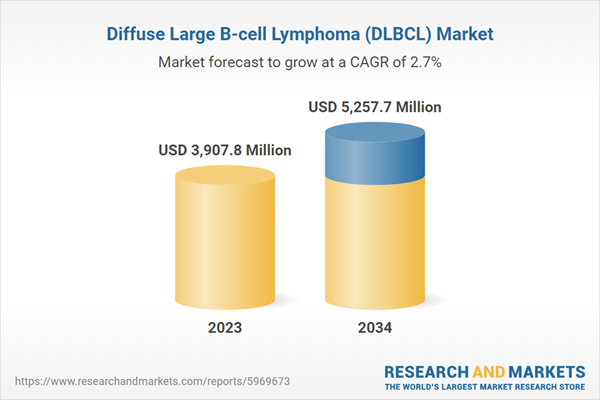Diffuse Large B-cell Lymphoma (DLBCL) market is currently driven by factors such as a rising patient pool, improving diagnosis and drug treatment rates, an increase in the geriatric population and rising safety and efficacy of current and emerging therapies, etc. Diffuse Large B-Cell Lymphoma, a form of non-Hodgkin lymphoma, represents the most common blood cancer. Lymphomas develop when immune cells, known as B lymphocytes, grow and multiply in an uncontrolled way. DLBCL develops mostly in adults and is a rapidly-growing (aggressive) lymphoma. It can begin in the lymph nodes or outside of the lymphatic system in the gastrointestinal tract, testes, thyroid, skin, breast, bone, or brain. Usually, the first symptoms of DLBCL is a painless swelling in the neck, armpit, abdomen, or groin caused by enlarged lymph nodes. This swelling can also be painful for some people. Other symptoms of DLBCL may include night sweats, unexplained fevers, and a loss in weight. DLBCL can occur at any age, however, it is generally rare in children and is more common in older people. Most people diagnosed with DLBCL are usually 60 or over. Furthermore, DLBCL affects slightly more males than females. Other risk factors include family history, certain infections, weakened immune system, obesity, exposure to certain chemicals, etc.
This report "Diffuse Large B-cell Lymphoma Market: Epidemiology, Industry Trends, Share, Size, Growth, Opportunity, and Forecast" provides an exhaustive analysis of the Diffuse Large B-cell Lymphoma market in the United States, EU5 (Germany, Spain, Italy, France, and United Kingdom) and Japan. The report provides an in-depth understanding of current and future landscape of the Diffuse Large B-cell Lymphoma market. This includes treatment practices, in-market, and pipeline drugs, share of individual therapies, market performance across the seven major markets, market performance of key companies and their drugs, etc. The report also provides the current and future patient pool for Diffuse Large B-cell Lymphoma across the seven major markets. According to the report the United States has the largest patient pool for Diffuse Large B-cell Lymphoma and also represents the largest market for Diffuse Large B-cell Lymphoma treatment. Furthermore, the current Diffuse Large B-cell Lymphoma treatment practice/algorithm, market drivers, challenges, opportunities, reimbursement scenario and unmet medical needs, etc. have also been provided in the report. This report is a must-read for manufacturers, investors, business strategists, researchers, consultants, and all those who have any kind of stake or are planning to foray into the Diffuse Large B-cell Lymphoma market in any manner.
Time Period of the Study
- Base Year: 2023
- Historical Period: 2018-2023
- Market Forecast: 2024-2034
Countries Covered
- United States
- Germany
- France
- United Kingdom
- Italy
- Spain
- Japan
Analysis Covered Across Each Country
- Historical, Current and Future Epidemiology Scenario
- Historical, Current and Future Performance of the Diffuse Large B-cell Lymphoma Market
- Historical, Current and Future Performance of Various Therapeutic Categories in the Diffuse Large B-cell Lymphoma Market
- Sales of Various Drugs Across the Diffuse Large B-cell Lymphoma Market
Competitive Landscape:
This report also provides a detailed analysis of the current Diffuse Large B-cell Lymphoma marketed drugs and late-stage pipeline drugs.In-Market Drugs
- Drug Overview
- Mechanism of Action
- Regulatory Status
- Clinical Trial Results
- Drug Uptake and Market Performance
Late-Stage Pipeline Drugs
- Drug Overview
- Mechanism of Action
- Regulatory Status
- Clinical Trial Results
- Drug Uptake and Market Performance
Key Questions Answered in this Report:
Market Insights
- How has the Diffuse Large B-cell Lymphoma market performed so far and how will it perform in the coming years?
- What are the markets shares of various therapeutic segments in 2023 and how are they expected to be in 2034?
- What was the country-wise size of the Diffuse Large B-cell Lymphoma market across the seven major markets in 2023 and how will it look like in 2034?
- What is the growth rate of the Diffuse Large B-cell Lymphoma market across the seven major markets and what will be the expected growth over the next ten years?
- What are the key unmet needs in the Diffuse Large B-cell Lymphoma market?
Epidemiology Insights
- What is the size of the Diffuse Large B-cell Lymphoma patient pool (2018-2023) across the seven major markets?
- What would be the forecasted patient pool (2024-2034) of Diffuse Large B-cell Lymphoma across the seven major markets?
- What are the key factors driving the epidemiological trend of Diffuse Large B-cell Lymphoma?
- What will be the growth rate of Diffuse Large B-cell Lymphoma patients across the seven major markets?
Current Treatment Scenario, Marketed Drugs and Emerging Therapies
- What are the current marketed Diffuse Large B-cell Lymphoma drugs and what are their market performance?
- What are the key pipeline Diffuse Large B-cell Lymphoma drugs and how are they expected to perform in the coming years?
- How safe are the current marketed Diffuse Large B-cell Lymphoma drugs and what are their efficacies?
- How safe are the late-stage pipeline Diffuse Large B-cell Lymphoma drugs and what are their efficacies?
- What are the current treatment guidelines for Diffuse Large B-cell Lymphoma drugs across the seven major markets?
- Who are the key companies in the Diffuse Large B-cell Lymphoma market and what are their market shares?
- What are the key mergers and acquisitions, licensing activities, collaborations, etc. related to the Diffuse Large B-cell Lymphoma market?
This product will be updated with the latest data at the time of order. Consequently, dispatch time for this product will be 7-10 business days.
Table of Contents
Table Information
| Report Attribute | Details |
|---|---|
| No. of Pages | 132 |
| Published | May 2024 |
| Forecast Period | 2023 - 2034 |
| Estimated Market Value ( USD | $ 3907.8 Million |
| Forecasted Market Value ( USD | $ 5257.7 Million |
| Compound Annual Growth Rate | 2.7% |
| Regions Covered | Global |









